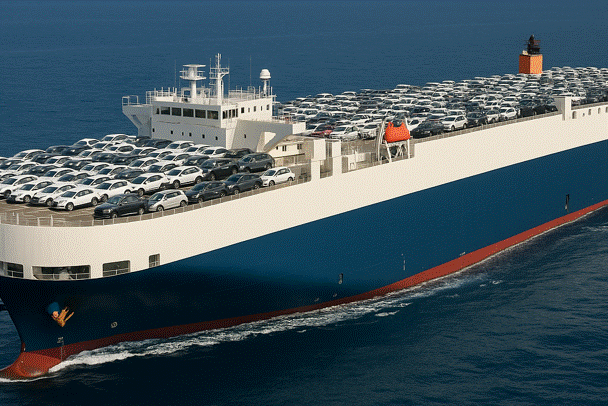HONG KONG / CAIRO — Ships loaded with thousands of Chinese-made vehicles are steadily transiting the Suez Canal en route to Europe—while competing automakers in Asia are forced into slower, more costly circuits around the African continent. Analysts suggest this stark advantage stems from an unspoken agreement between Beijing and the Huthi militia, enabling safe passage through the Red Sea amid heightened maritime conflict.
According to a New York Times investigation and corroborating intel from the maritime intelligence provider Lloyd’s List, at least 14 large Chinese auto-carriers sailed the Suez Canal in June and July, despite the Huthis sinking two other container vessels just weeks earlier. The Huthis—who have launched repeated strikes tied to the Israel-Hamas conflict and backed by Iran—have severely disrupted global shipping lanes, prompting major carriers like MSC, Maersk, Hapag-Lloyd, and HMM to reroute.
Transport analysts in the NYT report believe that the operation’s continued smooth transit suggests official tacit cooperation between China and the Huthis (or Iran), allowing Chinese vessels to save 14–18 days per trip between Asia and Europe.
Strategic Disruption to Global Supply Chains
The Huthi maritime assaults are eroding trade reliability. Last year, Tesla paused production at its German plant due to missing components—reportedly battery packs from supplier BYD affected by Red Sea disruptions. German automakers fared somewhat better, as their batteries are largely sourced from local European factories, according to Alexander Timmer of consulting firm Berylls.
Implications for Global Automotive Supply Chains
This evolving scenario underscores Beijing’s strategic advantage and raises concerns over supply chain resiliency:
- Time and cost reductions offer Chinese automakers a significant competitive edge.
- Political maneuvering in conflict zones creates unequal access for foreign shippers.
- Supply vulnerability for Western manufacturers reliant on Asian-made components is exacerbated by geopolitical volatility.
Industry observers say these developments may prompt major players to strengthen local procurement and diversify shipping routes to guard against disproportionate disruption.
Sources: The New York Times , Lloyd’s, Tesla

